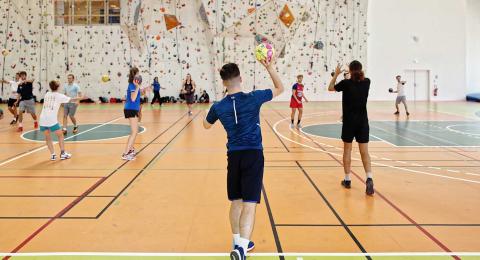Civil Engineering
This specialization aims to provide students with a high-level scientific and technological culture geared towards current and future industrial challenges in civil engineering (construction, geotechnics, transport, hydraulics, environment) and subsurface engineering. This dual culture enables students to pursue careers as teacher-researchers, researchers, R&D engineers or teachers in higher education, depending on their personal plans.
The 4-semester courses are organized into coherent teaching units (in the form of pathways and coloration) and broken down into blocks. This enables students to acquire the skills needed to organize and direct work arising from high-level scientific and technical activities. Students can complete their training by choosing optional modules designed to consolidate their theoretical foundations, specify their scientific and technical languages, and fine-tune their professional orientation. Some courses are shared with the Mechanics specialization (scientific knowledge and skills, numerical and linguistic skills). In the case of Master 1 GEO, all modules are shared with the engineering curriculum at CentraleSupélec. Optional modules are offered in the Energy field. At the end of Master 1, it is possible to transfer between the different master program.
Information
Master’s Year 1
Master’s Year 2
The specialization has been designed with identified objectives and skills for both further study and professional integration, with ongoing work on coherent articulation of the different levels from bachelor's to doctorate. The offer is built around blocks of knowledge and skills, covering both solid disciplinary knowledge and skills, as well as cross-disciplinary skills in research, professionalization and openness. By the end of their Master's program, graduates are specialists in three fundamental areas: modeling, calculation and analysis of results. In addition, this training enables students to acquire a range of cross-disciplinary skills, such as the ability to conduct bibliographical research and critical analysis; to organize and run an industrial/scientific project independently or as part of a group; to communicate, exchange, transmit and disseminate knowledge effectively.
Learning outcome targets
This specialization coordinates specialties in civil engineering in the broad sense of the term: construction, geotechnics, transport, hydraulics, environment) and subsurface engineering. It interacts closely with the fields of mechanics, energy and the environment. The knowledge and skills acquired are quite broad (three Master 2 courses). The program is very much geared towards a career in research (in private companies, universities or public research organisms) and/or teaching. For 2 courses, the language of instruction is mainly English. The main aim of the Civil Engineering master's courses is to provide a high-level scientific and technological culture geared towards current and future industrial and societal challenges. Civil engineering accounts for around 10% of France's GDP, 44% of energy consumption and 23% of greenhouse gas emissions!
For aspects relating to buildings in their environment, expertise and continuity of knowledge in multi-scale and multi-physics behavior of building materials through to the envelope and structure are expected. With regard to subsurface engineering, the course aims to provide expertise and continuity of knowledge on the strong interaction between soil and construction, in relation to seismic risk, and the exploration and operation of reservoirs and storage facilities (water, gas, oil, CO2, waste, etc.). In addition, mastery of advanced experimental methods of analysis and characterization, and numerical calculation methods for solving non-linear problems in solid and fluid mechanics, as well as in mass and energy transport, are important elements of the curriculum. It also enables students to acquire in-depth knowledge of statistical analysis, model reduction, artificial intelligence learning and risk analysis for civil and underground engineering. The Master 2 program (excluding FESup) includes introductory research projects and research internships (in France and abroad).
Depending on their personal goals, students can opt for a wide range of careers in the field of Civil Engineering. The 2 GEO/GEO2 courses (Geomechanics and Structures/Geomechanics and Subsoil) and “Advanced Materials, Structures and Energy for Sustainable Construction” are research-oriented, leading to both immediate professional integration and doctoral studies. Jobs are available in engineering and research, in innovative SMEs, large corporations, research organizations and higher education. Students trained in this way can go on to study for a doctorate in an academic or industrial research laboratory, under a CIFRE contract for example. Numerous contacts with academic laboratories in France and abroad, companies (Bouygues, EDF, SNCF, ECOCEM, PAREX, Vinci, RTE, etc.) and research organizations (ASNR, SEISM Paris Saclay Institute BRGM, CEA, IFPEN, CSTB, etc.) facilitate job opportunities. In the case of the FESUP (Formation à l'Enseignement SUPérieur) pathway, students are expected to take up teaching and training-related positions: agrégés professors in high schools or higher education for those who have passed the agrégation competitive examination, teacher-researcher, engineer or R&D expert positions following a doctorate, for example.
Target audience
The Civil Engineering Master's program is aimed at students with a bachelor's degree in physics, mechanics or engineering. Prerequisites include a basic knowledge of solid and fluid mechanics, structural engineering, matrix algebra and differential calculus, and numerical methods. For non-French-speaking international students, a minimum B2 level is required for courses taught in French (Master 1 “Advanced Materials, Structures and Energy for Sustainable Construction” and Master FESup). For other courses taught mainly in English (Master 1 GEO, Master 2 GEO2 and Master 2 “Advanced Materials, Structures and Energy for Sustainable Construction”), an English language certificate is required for non-English speakers.
The program recruits around a few dozen students out of more than a thousand applications, paying particular attention to prerequisites to ensure success. However, refresher courses are offered in the first 2 weeks of the Master 2 course (outside FESup), given the wide range of students recruited and the fact that foreign civil engineering schools tend to focus on construction engineering. It should also be noted that the course is integrated into the ENS Paris-Saclay diploma for ENS Paris-Saclay students. At CentraleSupélec, 3rd-year engineering students interested in civil engineering can follow one of the M2 courses (not part of the FESup program).








